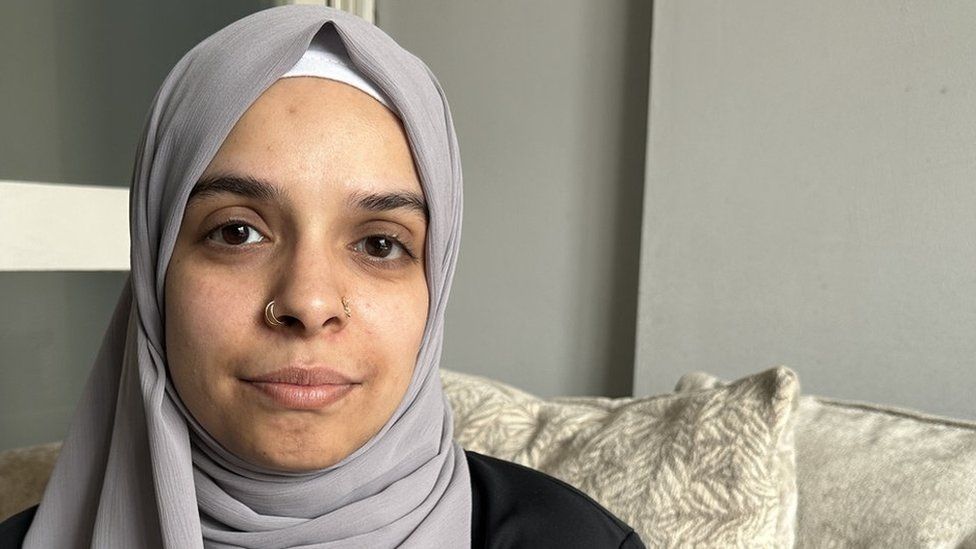ARTICLE AD BOX

Shella Iqbal wants to provide a "voice" for Asian women suffering with endometriosis
By Emma Snow & Samantha Jagger
BBC News
The leader of an endometriosis support group has told of her anguish in getting a diagnosis and urged other Asian women to talk about the disease.
Shella Iqbal was 12 when her symptoms began and in 2018 was diagnosed with the most severe form of the condition.
The 30-year-old, from Derby, said there was still a taboo around the condition in her community, adding she wanted to provide a "voice" for Asian women.
Currently it takes eight years, on average, to get a diagnosis.
Ms Iqbal said she had had three operations to remove endometriosis tissue and had been put into chemical menopause five times but "nothing has helped".
She explained she was due to have a fourth surgery because the disease had spread and was causing shortness of breath.
She is now an Endometriosis UK support group leader and provides advice to other women with the condition.
What is endometriosis?
- Endometriosis is a condition where tissue similar to the lining of the womb grows in other places, such as the ovaries and fallopian tubes
- It can affect women of any age, including teenagers
- It is a long-term condition that can have a significant impact on your life, but there are treatments that can help
- Symptoms can include pain in your lower tummy or back (pelvic pain) - usually worse during your period - period pain that stops you doing your normal activities, pain during or after sex, and difficulty getting pregnant
Ms Iqbal said she had met other women from her community at hospital, whose families did not know that they were at a gynaecology appointment or that they were suffering.
"I'm like a voice for the unheard, and for those who can't speak about it," she said.
Because "some Asian women do not want to talk about it", she said she was concerned that diagnosis statistics could be incorrect.
"I want to break that barrier and break that taboo, so we can understand why it happens," she said.
Chetna Mistry wants other women with the condition to know there are support groups available
Chetna Mistry, 44, was diagnosed in 2015 with the condition, which she said had "destroyed her life".
She said she had to give up her job as a preschool leader because the daily pain became too much.
The disease has also reduced her chances of having children, due to growth on her ovaries.
"If I was treated earlier or diagnosed faster, I would have had something to hold on to," she said.
"But now I'm just moving on and trying to live life, and to experience life with what I have left."
Ms Mistry, who uses a Leicester support group, said she had to move GPs to be "taken seriously", something she said was common for people with the condition.
She wants other people living with endometriosis to know there are support groups to help those "feel less alone".
Radha-Priya Mistry said endometriosis could be "really isolating"
Radha-Priya Mistry, who lives in Leicester, said the disease had taken a "huge toll" on her mental health after waiting six years for a diagnosis.
The 34-year-old said she also had to quit her job due to the pain and symptoms.
"I had to move home because I couldn't afford rent. It's really isolating," she said.
She wants medical professionals, who are not specialists, to have more awareness of endometriosis so that other women can get help faster.
James Phillips, consultant in obstetrics and gynaecology at Nottingham University Hospitals NHS Trust, said there could be a "lack of understanding" from medical professionals.
"There's often an overlap with other common symptoms, and there can be a normalisation of symptoms from friends, family and other healthcare professionals," he said.
"It's also about recognising conditions affecting women are just as important as those that affect men, and ensuring that we've got fair distribution of those resources in research and the healthcare system."
In July, it was announced that a test was being developed at the University of Hull that could cut diagnosis time to just eight days.
Follow BBC East Midlands on Facebook, Twitter, or Instagram. Send your story ideas to eastmidsnews@bbc.co.uk.
Related Internet Links
The BBC is not responsible for the content of external sites.

 1 year ago
32
1 year ago
32








 English (US) ·
English (US) ·